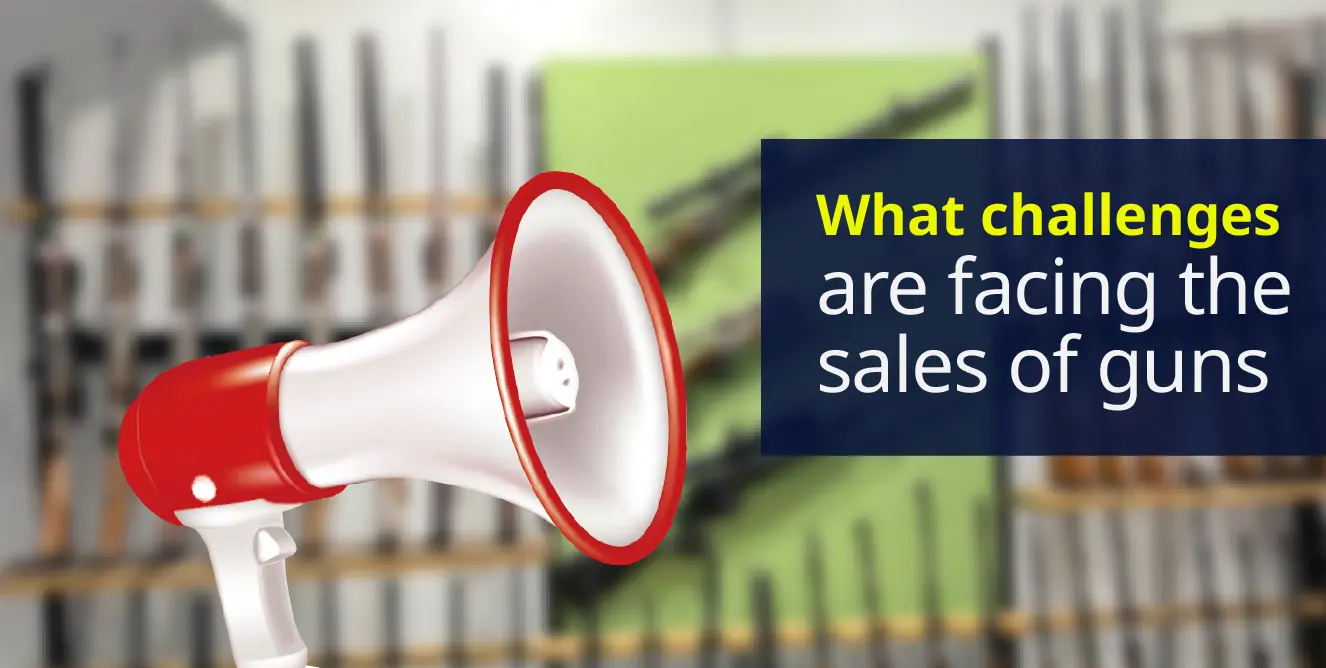What challenges are facing the sales of guns?
06-Aug-2024

Mark Eves
A comprehensive review
We have been researching the government statistics from April 2022 - March 2023, the next report for April 2023 - March 2024, is due to be released soon. This article focuses on analysing these statistics and how they are affecting the market.
Significant decrease in certificates issued
There were 147,140 firearm certificates and 500,894 shotgun certificates on the issue as of March 2023, representing decreases of 3% and 4% respectively compared to the previous year. This marks the lowest number of shotgun certificates since records began.
We can relate this to 5 factors.
Impact of COVID-19 Pandemic: The pandemic led to delays and backlogs in processing applications due to restrictions, reduced staffing, and other operational challenges faced by police forces during this period. This disrupted normal service levels and slowed down the issuance of certificates.
Enhanced scrutiny and tightened regulations have Increased scrutiny and more stringent regulations have been implemented in response to public safety concerns, particularly following high-profile incidents involving firearms. This has resulted in more thorough background checks and longer processing times, contributing to fewer certificates being issued.
Many police forces have been dealing with administrative backlogs, leading to significant delays in processing both new applications and renewals. This inefficiency has directly impacted the number of certificates issued within the reporting period.
Changes in public perception regarding gun ownership and tighter control measures may have led to a decline in the number of individuals applying for firearm and shotgun certificates. The heightened awareness and stricter enforcement policies have likely discouraged some potential applicants.
The economic impact of the pandemic and other financial considerations might have influenced individuals' decisions to apply for or renew firearm and shotgun certificates, leading to a decline in applications.
Increase in revocations
The number of firearm certificates revoked increased by 9% (418 total), and shotgun certificate revocations rose by 8% (1,161 total). These revocations reflect heightened scrutiny and enforcement.
Rise in lost or stolen firearms
A total of 522 firearms and shotguns were reported lost or stolen, a 19% increase from the previous year. This uptick raises concerns about firearm security.
Increase in the average number of weapons per certificate
The average number of firearms held on a firearm certificate rose to 4.2, and for shotguns, it increased to 2.7. This steady rise over the past decade indicates a trend towards multiple weapon ownership among certificate holders.
Whilst the rest of this report is glom and doom, this statistic saying whilst there is less licence holders, the current holders are buying many more guns than before.
Young applicants on the rise
There was a 5% increase in firearm certificates issued to individuals under 18, highlighting a growing interest in shooting sports among younger people. This is great news, as without new blood, shooting will decline and will ultimately be phased out. But with this new generation of shooters come through, it ensure a sold future for the sport and hunting communities.
Applications rejected
Firearm certificate application rejections increased by 4%, with common reasons including medical suitability and public safety concerns.
In many jurisdictions, individuals can be refused a gun license on various medical grounds to ensure public safety and prevent firearms from being accessed by those who may pose a risk to themselves or others. Common medical reasons for refusal include:
Mental health conditions:
Severe Depression - Individuals with a history of severe depression, especially those with suicidal tendencies, may be deemed unfit to possess firearms.
Psychosis - Conditions such as schizophrenia or bipolar disorder that involve psychotic episodes can disqualify an applicant.
Personality Disorders - Certain personality disorders, especially those associated with aggressive or violent behaviour, can be grounds for refusal.
Substance Abuse - History of drug or alcohol abuse can lead to a denial, as substance abuse can impair judgment and increase the risk of violent behaviour.
Cognitive impairments:
Dementia - Cognitive decline conditions, like Alzheimer's disease, can affect judgment and decision-making capabilities.
Intellectual disabilities - Significant intellectual disabilities that impact cognitive functions and decision-making.
Neurological conditions:
Epilepsy - Uncontrolled epilepsy or frequent seizures can lead to refusal due to the unpredictability and potential loss of control.
Severe brain injuries - History of severe brain injuries that affect cognitive or emotional stability.
Physical disabilities:
While not commonly a ground for refusal, severe physical disabilities that impair the safe handling and operation of a firearm can sometimes be considered.
Behavioural history:
History of violence - Documented history of violent behaviour, even if not directly related to a specific mental health diagnosis.
Risk of harm - Any condition that a medical professional deems increases the risk of harm to self or others.
Temporary medical conditions:
Certain acute medical conditions or temporary mental health crises that are expected to resolve might lead to a temporary refusal or suspension of a firearm license.
Applicants typically undergo a thorough background check, which includes a review of medical records and, in some cases, an assessment by a healthcare professional. The specific criteria and processes can vary significantly by country and even by region within countries. For instance, in the UK, the police may request a medical report from the applicant's general practitioner (GP) as part of the firearm or shotgun certificate application process. This report would highlight any medical issues that might affect the applicant's fitness to possess a firearm.
Lengthy processing times
The average processing time for new applications and renewals has increased, with some applicants waiting over six months due to administrative backlogs.
Determining which police forces are the "worst" at processing firearm and shotgun license applications can be subjective and depends on various factors, including processing times, application backlogs, and the number of complaints received.
However, some police forces have historically faced criticism for their handling of these applications. Common issues include delays in processing, lack of communication, and inconsistent application of regulations. Here are some notable examples based on available reports and user feedback:
Metropolitan Police - The Metropolitan Police have been criticised for long processing times and significant backlogs in firearm and shotgun license applications. Given the large population and volume of applications in London, this has been a recurring issue.
Greater Manchester - This police force has also faced scrutiny over delays and inefficiencies in processing firearm and shotgun licenses. Applicants have reported waiting several months beyond the expected processing times.
Thames Valley - There have been reports of prolonged delays and communication issues with the Thames Valley Police regarding firearm and shotgun license applications.
West Midlands - West Midlands Police have been noted for significant delays in the processing of firearm certificates, leading to frustration among applicants.
Devon and Cornwall - Despite being in a rural area with a high number of firearm and shotgun owners, Devon and Cornwall Police have experienced backlogs and delays in processing applications.
These issues can arise from various factors such as underfunding, understaffing, and increased scrutiny and regulatory requirements. Efforts to improve the situation include increased funding, better resource allocation, and streamlined processes.
Firearm types in circulation
There is a notable increase in the number of semi-automatic rifles and shotguns, which now constitute a larger proportion of the total firearms in circulation compared to previous years.
Conclusion
The analysis of government statistics from April 2022 to March 2023 highlights several critical trends and challenges facing the gun market. The significant decrease in firearm and shotgun certificates issued, with numbers reaching historic lows, underscores the impact of the COVID-19 pandemic, enhanced scrutiny, and tightened regulations. Administrative backlogs and changes in public perception further contribute to the decline in new applications and renewals.
Despite the overall reduction in certificate holders, the increase in the average number of weapons per certificate and the rise in young applicants indicate a shift towards multiple weapon ownership and growing interest in shooting sports among younger generations. This could bode well for the future of the sport and hunting communities, ensuring their sustainability.
Conversely, the uptick in revocations and the rise in lost or stolen firearms highlight ongoing concerns about firearm security and enforcement. The increase in rejected applications due to medical and public safety concerns emphasises the need for stringent background checks and thorough evaluations of applicants' suitability.
Lengthy processing times and inefficiencies in certain police forces, such as the Metropolitan Police, Greater Manchester Police, and others, reflect systemic issues that require attention. Addressing these administrative challenges through better funding, resource allocation, and streamlined processes is essential for improving service levels and reducing delays.
Overall, while the market faces numerous challenges, the resilience and adaptability of the community, along with targeted improvements in administrative and regulatory practices, can help navigate these obstacles and foster a safer and more sustainable environment for gun ownership and shooting sports.
Must read:
